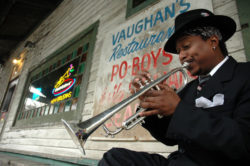Kermit Ruffins
New Orleans trumpeter Kermit Ruffins names Louis Armstrong, Louis Jordan, and Eddy Jefferson as major influences on his musical style.

Courtesy of David Rae Morris
Kermit Ruffins in Front of Vaughn's Lounge. Morris, David Rae (photographer)
Jazz trumpeter, singer, and bandleader Kermit Ruffins is one of New Orleans’s most beloved living musicians and personalities. Heavily influenced and inspired by the music of Louis Armstrong and Louis Jordan—his self-proclaimed “idols” from a bygone generation—Ruffins intersperses traditional jazz standards with original compositions, often accompanying his instrumentals with his own vocals. His live performances are popular in his hometown and beyond for their musical prowess and informality. His longstanding Thursday night performance at Vaughn’s Lounge in the Bywater neighborhood of New Orleans, a tradition begun in 1992, was a favorite draw for tourists and locals alike until Ruffins quit the gig in 2013. Ruffins is credited as one of many artists responsible for bringing traditional jazz out of the formality of Preservation Hall and back to the neighborhood nightclubs and streets of New Orleans, where an aging musical genre was re-energized for a younger generation. Ruffins was among the founders of the Rebirth Brass Band, and his records and live performances continue to feature both the most famous and the unsung practitioners of New Orleans jazz.
A Jazz Prodigy
Ruffins was born at Touro Hospital in New Orleans on December 19, 1964, to Lloyd and Esther Ruffins, who named him after his paternal grandfather. He was raised in the city’s Lower Ninth Ward, where as a child he could be found marching around the neighborhood imitating a brass band parade. He would play the mouthpiece of a trumpet loaned to him from his uncle Percy, who eventually gifted him the full instrument. Ruffins began formal instruction on the trumpet in the eighth grade at Lawless Junior High School, and by all accounts, soon developed into a formidable talent. Inspired by the formation and success of the Dirty Dozen Brass Band, Ruffins and his Clark High School bandmate, tuba player Phillip Frazier, and Phillip’s brother, drummer Keith Frazier, jointly founded Rebirth in 1983, never imagining at the time that the fledgling group would become one of the most well-known brass bands to come out of New Orleans.
New Orleans’s brass band scene was viewed as staid and orthodox in Ruffins’s youth—“old guys in the old uniforms, playing the old songs,” as he defined his musical forebears in a 2011 interview for 504 Magazine—but emerging groups such as Rebirth added a youthful exuberance to the city’s ever-evolving jazz tradition. Rebirth began by busking for tips in the French Quarter but soon became the house band at the Glass House nightclub, previously the home venue of the Dirty Dozen. Rebirth’s fast-paced rhythms and jubilantly blaring horns widened the circle of jazz fans, and the band began regularly attracting younger, college-aged audiences who were eager to dance and carouse late into the night. It was with Rebirth Brass Band that Ruffins’s talents as a composer emerged, contributing “Do Whatcha Wanna,” “Put Your Right Foot Forward,” and other songs that would go on to become brass-band classics. With Rebirth, Ruffins released multiple albums, beginning with Here to Stay (1984), on Arhoolie Records.
After parting amicably with Rebirth, Ruffins founded the Barbeque Swingers in the early 1990s, a more traditional jazz quintet that incorporated both his love of music and traditional New Orleans cooking. Ruffins has been known to barbecue meat for his fans from a grill in the bed of his pickup truck after finishing his nightclub sets. Beginning with World on a String (1992), released on Justice Records, Ruffins put out a number of albums on various labels with the Barbeque Swingers before partnering with Basin Street Records at the end of that decade. World on a String featured collaborations with such noted New Orleans jazz musicians as Danny Barker, Ellis Marsalis, Walter Payton, Lucien Barbarin, and Shannon Powell. With Basin Street Records, Ruffins reached perhaps his strongest musical stride, releasing to critical success 1533 St. Philip Street (2001), Live at Vaughn’s (2007), Livin’ a Treme Life (2009), and more.
Musical Ambassador of New Orleans
Ruffins’s role as an unofficial ambassador of New Orleans took on greater significance after Hurricane Katrina. He was invited by President George W. Bush to perform on the lawn of the White House at the 2007 Congressional Picnic that also showcased the food of New Orleans chef Paul Prudhomme. His cameo appearances on the HBO television series Treme (2010–2013)—where he played himself—further publicized Ruffins and exposed his music to a larger audience. In 2011 Ruffins signed a lease to reopen the legendary Mother-in-Law Lounge on Claiborne Avenue in New Orleans, the former nightclub, residence, and museum of the eccentric R&B performer Ernie K-Doe. In 2012 Ruffins opened his own restaurant and bar, Kermit’s Treme Speakeasy. There, he cooks and performs, commonly appearing in his trademark Panama hat and bandanna and launching his opening set with a rousing phrase known to all of his fans—“All aboard!”
